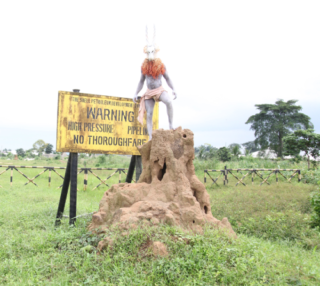
Karikpo Pipeline 2015/2021
five-channel video installation, 27’31’’
Courtesy of the artist and Niger Delta Flow Gallery
Zina Saro-Wiwa’s interdisciplinary practice engages variously with the cultural, political, ecological, spiritual and economic dimensions of life in the Niger Delta. She articulates relationships to land and place through the use of poetic displacement and performance. Karikpo Pipeline, shot in Ogoniland, juxtaposes sequences showing the infrastructure of oil extraction with evocations of invisible and spiritual energies. The title of the work refers to Karikpo, a playful and popular Ogoni masquerade that is performed each year with carved antelope masks. The oil pipelines traversing the region form the dramatic backdrop for the dancers, who mimic the lively movements of the animal. The elongated presentation of the work that takes place over five screens speaks to the pipeline through which multiple forces both spiritual and industrial are channeled. The long evocative roads and pathways that appear frequently in the work summon the idea of “possessed roads” in Ogoniland that young locals feared walking down in the early days of oil extraction. But whilst the possession young Ogoni children were warned of was ‘spiritual’, the real reason was the oil companies who “legally” possessed the land and banned the presence of local people. For Saro-Wiwa this particular slippery, poetic homonym ‘possession’ has opened a portal for this multi-channel video work that questions authorship and stewardship of contested landscapes such as Ogoniland. For ‘Rethinking Nature’, Saro-Wiwa has created a new iteration of the work with a specially-composed soundtrack incorporating the sounds of the bells Karikpo dancers wear on their ankles as well as ambient elements that allude to notions of summoning, surveillance and terrestrial forces that disrupt and defy governance.
Artist statement
Ogoniland is so much more than Big Oil and its despoilment. There are many other deeper conversations taking place that have absolutely nothing to do with Oil. It is a very special and unique place in its own right and not because of the tragic prominence it gained as a result of the criminal killing of one of its sons, my father, Ken Saro-Wiwa plus eight other innocent men. This work begins to tease out those buried narratives using masquerade as a symbol for the subcutaneous mysteries that exist and emerge periodically to those that are open to engaging with it. Masquerade is a powerful spiritual technology that hides within cultural affect that appears merely playful. And for that reason I juxtapose this performance with remnants of oil extraction such as well heads, flow stations and exposed pipelines. To my mind, the concerns of big environmental groups don’t necessarily speak to and for others in developing countries. Oil and the crimes of companies such as Shell Oil are certainly part of our environmental puzzle in the Niger Delta but there is much more to consider. To my mind in order to access the lessons of the earth and to fight back we must be still. We must listen and we must be a channel for the land. We as humans overestimate our importance. So for me a Niger Delta environmentalism has to implicate invisible ecosystems. It’s time to decolonize Environmentalism, not only from colonial powers but from humanity altogether and that way I am convinced humans can forge a far deeper; more surprising and successful approach to environmental challenges.